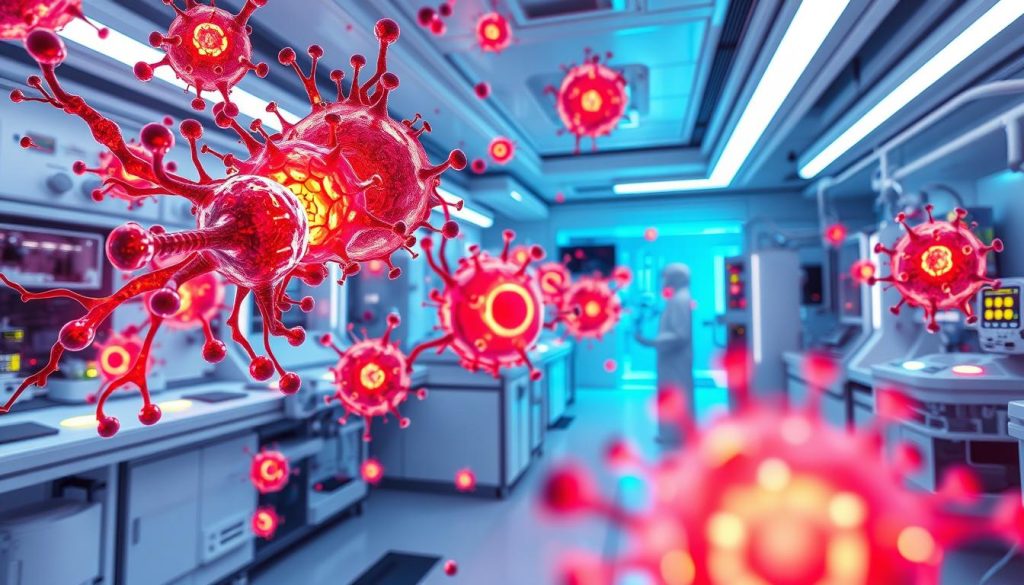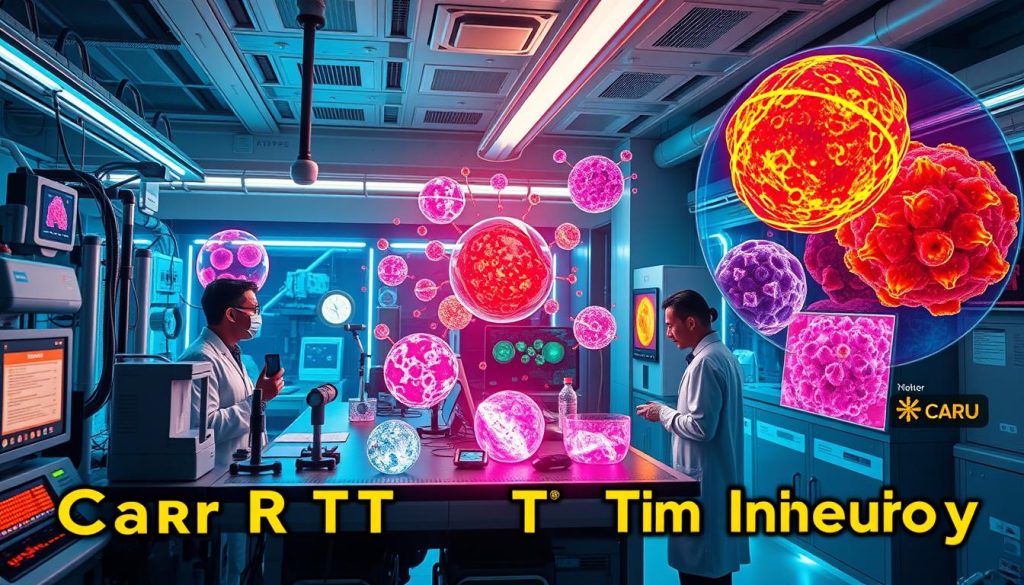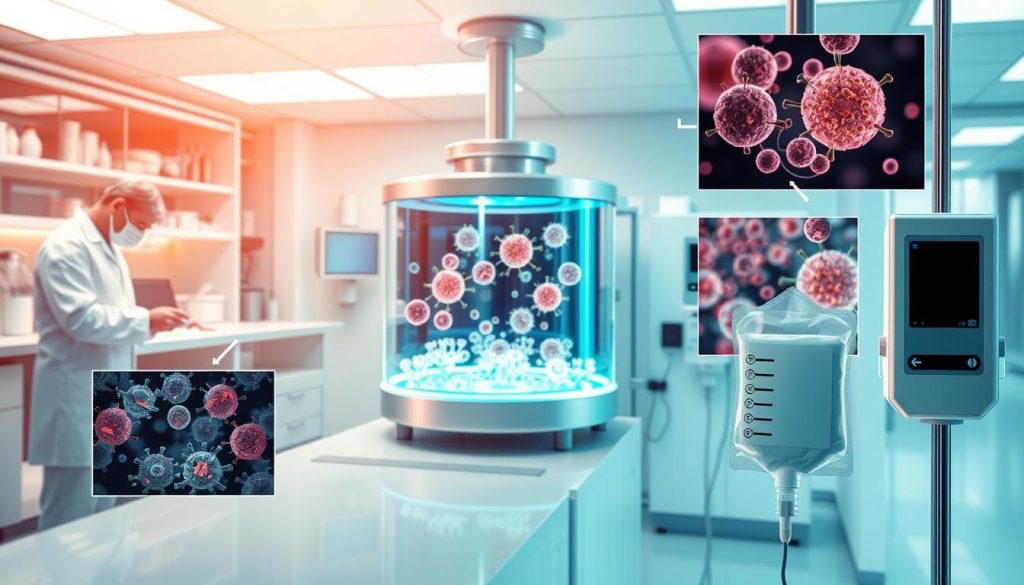In the world of cancer treatment, CAR T-cell therapy is a big step forward. It brings new hope to those with certain types of cancer. This guide will help you understand what cancers can be treated with CAR T-cell therapy. It’s here to help you and your loved ones grasp this innovative cancer therapy.
This guide will be your friend as you learn about CAR T-cell therapy. It will show you how it can fight different cancers. It also explains how it tailors treatment to each patient’s needs.
Key Takeaways
- Understanding CAR T-cell therapy as a leading-edge, personalized cancer treatment.
- Insight into what cancers can be treated with CAR T-cell therapy, including blood cancers and beyond.
- The role of this guide in explaining how personalized medicine has shaped innovative cancer therapies.
- Awareness of the benefits, limitations, and the impact of CAR T-cell therapy on patient care and treatment outcomes.
- Preparation for exploring the detailed patient journey, from therapy selection to post-treatment care.
The Basics of CAR T-Cell Therapy Cancer Treatment
Car t-cell therapy cancer treatment is a new way to fight cancer. It changes a patient’s T-cells to find and kill cancer cells better. This section explains how it works and why it’s changing cancer care.
Understanding CAR T-Cell Immunotherapy
CAR T-cell immunotherapy starts with taking T-cells from a patient’s blood. These T-cells are then changed in a lab to have special receptors. When these CAR T-cells go back into the patient, they can find and attack cancer cells more easily.
The Science Behind Targeting Cancer Cells
The magic of car t-cell therapy cancer treatment is its ability to find and hit specific cancer cells. This is important because it helps the immune system fight cancer without harming healthy cells. Below is a picture showing how CAR T-cells work to fight cancer.
| Cancer Type | Target Antigen | Response Rate |
|---|---|---|
| Acute Lymphoblastic Leukemia | CD19 | Up to 90% |
| Diffuse Large B-Cell Lymphoma | CD19 | 50-70% |
| Multiple Myeloma | BCMA | 70-80% |
| Chronic Lymphocytic Leukemia | CD19 | 50-60% |
This table shows how well car t-cell immunotherapy works against different cancers. It shows how the therapy can target cancer cells well. As research goes on, CAR T-cell therapy is getting even better, offering hope to more patients.
Introduction to CAR T-Cell Treatment for Blood Cancers
The use of blood cancers treated with CAR T-cells is a big step forward in fighting cancer. It brings hope to those with leukemia. Leukemia CAR T-cell therapy helps the body’s immune system fight cancer better.
Leukemia CAR T-cell therapy uses special T-cells to find and kill cancer cells. This is especially helpful for those with hard-to-treat leukemia.
Using CAR T-cells helps target cancer cells without harming healthy ones. For more on this treatment, check out a detailed article on CAR T-cell therapy.
| Cancer Type | Treatment Approach | Research Phase |
|---|---|---|
| Leukemia | CAR T-Cell Therapy | Clinical Trials |
| Lymphoma | CAR T-Cell Therapy | Advanced Clinical Trials |
| Multiple Myeloma | CAR T-Cell Therapy | Early Clinical Trials |

Research and trials are ongoing to improve leukemia CAR T-cell therapy. They aim to make it safer and more effective. This could help treat other cancers too, like lymphomas and multiple myeloma.
Learning more about blood cancers treated with car t-cells helps make treatments better. It leads to more personalized care for patients.
What Cancers Can Be Treated with CAR T-Cell Therapy
CAR T-cell therapy has made big strides in cancer treatment. It’s now used for many cancers, not just blood cancers. This includes aggressive lymphomas CAR T-therapy.
Potential and Approved Cancer Types for CAR T-Cell Treatment
Right now, what cancers can be treated with CAR T-cell therapy mainly includes blood cancers. Leukemia, lymphoma, and multiple myeloma have shown good results. The FDA has approved CAR T-cell treatments for some non-Hodgkin lymphoma and acute lymphoblastic leukemia.
- Acute Lymphoblastic Leukemia (ALL)
- Non-Hodgkin Lymphoma
- Multiple Myeloma
FDA approvals are a big deal for CAR T-cell therapy. But, research is making it even more useful.
The Expanding Horizon of CAR T-Cell Applications
Research is looking into using CAR T-cell therapy for aggressive lymphomas CAR T-therapy and solid tumors. It’s a big challenge because solid tumors are harder to treat than blood cancers.
Scientists are also testing CAR T-cells for brain, ovary, and prostate cancers. CAR T-cell therapy could change how we treat cancer in the future.
Leukemia and CAR T-Cell Therapy: A Focus on Treatment Protocols
The world of leukemia car t-cell therapy is growing fast. It’s a big step forward in treating cancer in a way that’s just right for each person. This part talks about how CAR T-cell therapy works for different types of leukemia, like Acute Lymphoblastic Leukemia (ALL) and Chronic Lymphocytic Leukemia (CLL).

Acute Lymphoblastic Leukemia (ALL) and CAR T-Cells
Acute Lymphoblastic Leukemia mainly hits kids. But CAR T-cell therapy is showing great promise. It makes T-cells from the patient to fight leukemia better. This method is not only working well but also shows the power of treating cancer in a way that’s just for you.
Chronic Lymphocytic Leukemia (CLL) Response to CAR T-Cell Therapy
For Chronic Lymphocytic Leukemia, mostly found in adults, CAR T-cell therapy results are mixed. This has led to a lot of research to make the treatment better. Changes in how the cells are made and given show how flexible cancer treatment can be. It’s all about making it work for more people.
“CAR T-cell therapy is adapting rapidly to meet the complex demands of leukemia treatment protocols, offering hope and a new lease on life to many facing these challenging diagnoses.”
Lymphoma CAR T-Cell Therapy: Advancements and Patient Outcomes
The lymphoma CAR T-cell therapy has changed the game in treating lymphoma. It brings hope to patients who had few options before. This therapy uses special T-cells to attack cancer cells better than before.
New breakthroughs in lymphoma CAR T-cell therapy have shown great results. It works best for hard-to-treat lymphomas. This therapy uses the body’s immune system to fight cancer, offering a personalized treatment.
- Prolonged Remission: Many studies have found that a lot of patients stay in remission for a long time.
- Reduction in Side Effects: New ways of treating have made side effects less common and less severe.
- Accessibility: Work is being done to make this therapy available to more people.
Research in CAR T-cell immunotherapy for lymphoma is getting better all the time. Every new study and patient helps improve the therapy. As this field grows, we can expect even better results and more people can benefit from lymphoma CAR T-cell therapy.
Multiple Myeloma and CAR T-Cells: Innovations in Care
Multiple myeloma car t-cells are a beacon of hope in cancer treatment. This therapy is more than a treatment; it’s a revolution. It offers new hope for those with this tough condition.
Current CAR T-Cell Trials for Multiple Myeloma
Research on CAR T-cell therapy is making big strides. Trials for multiple myeloma are key. They help us understand and improve these therapies.
- Exploration of dosage optimization to maximize therapeutic impacts while minimizing side effects.
- Investigation of combinatory approaches with other innovative cancer therapies to improve outcomes.
- Longitudinal studies to understand long-term benefits and potential relapse rates.
Real-World Success Stories and Challenges
Using CAR T-cells in real-world treatment has shown both success and challenges. Patient stories and early data show the therapy’s potential. They light the way for future treatments.
“This treatment gave me a new lease on life when all other options seemed exhausted.” – A multiple myeloma survivor
But, there are still big hurdles. Problems like cytokine release syndrome and neurotoxicity need more research. We must find better ways to manage these issues.
The growth of multiple myeloma car t-cells shows how fast medical research can change lives. It brings hope to patients all over the world.
Aggressive Lymphomas and the Impact of CAR T-Therapy
Aggressive lymphomas are a big challenge in medicine because they grow fast and don’t respond well to usual treatments. Before, patients with these lymphomas had little hope for long-term recovery. But, aggressive lymphomas CAR T-therapy has brought new hope. This method uses car t-cell therapy cancer treatment to kill cancer cells better than before.
CAR T-cell therapy has changed the game for those with aggressive lymphomas. Patients who used to have poor chances now have a treatment that can greatly increase their survival time and improve their life quality. The treatment is made just for each patient, making it more effective.
The biggest win of CAR T-cell therapy cancer treatment is the better survival rates for aggressive lymphomas. Patients who would often relapse after chemotherapy are now in remission for longer. This shows how powerful the therapy is and how it could be a key treatment for high-risk lymphomas.
- Efficacy: High rates of durable remission compared to traditional therapies.
- Patient Quality of Life: Significant improvements due to reduced disease symptoms and treatment side effects.
- Innovation: Ongoing research promises to further enhance the specificity and effectiveness of treatment protocols.
The treatment for aggressive lymphomas is changing thanks to aggressive lymphomas CAR T-therapy. As scientists learn more about CAR T-cells, they can make treatments even better. This could turn even the worst diagnoses into something more manageable.
Expanding the Use of CAR T-Cell Therapy Beyond Hematologic Cancers
As innovative cancer therapies evolve, CAR T-cell therapy leads the way. It’s now being tested for solid tumors and rare cancers. This could open up new ways to fight cancer.

Solid Tumors and the CAR T-Cell Therapy Approach
Dealing with solid tumors is tough for CAR T-cell therapy. It needs to find the right targets on cancer cells without harming healthy ones. But, new studies show hope. They’ve found specific targets for solid tumors like breast, pancreatic, and brain cancers.
New Frontiers: CAR T-Cells and Rare Cancers
Rare cancers often have few treatment options. But CAR T-cell therapy might change that. It uses genetic engineering to make T-cells attack cancer cells. This could offer new hope for cancers that were thought untreatable.
Here’s a look at how CAR T-cell therapy is being explored for solid tumors and rare cancers:
| Cancer Type | Target Antigen | Current Stage of Research |
|---|---|---|
| Breast Cancer | HER2 | Clinical Trials Phase II |
| Pancreatic Cancer | Mesothelin | Preclinical |
| Glioblastoma | IL13Rα2 | Clinical Trials Phase I |
This table shows how CAR T-cell therapy is leading to new treatments. It brings hope to those facing tough cancer battles.
Personalized Cancer Treatment with CAR T-Cells
At the forefront of oncological innovation, personalized cancer treatment is dramatically evolving through advances in CAR T-cell immunotherapy. This method epitomizes the shift towards a more individualized approach, tailoring treatment based on the unique genetic profiles of each patient’s cancer.
CAR T-cell immunotherapy is not just a standard treatment; it is highly personalized. Starting with the extraction of a patient’s T-cells, these cells are then genetically engineered to fight cancer cells more effectively. This process is crucial, as each step involves close consideration of genetic, environmental, and individual health factors that influence treatment efficacy.
The Role of Genetic Profiling in CAR T-Cell Therapy
Genetic profiling stands as a pillar in the customization of CAR T-cell immunotherapy. By decoding the genetic information, oncologists can pinpoint specific antigens on cancer cells, guiding the design of CAR T-cells to target them more accurately. This genetic mapping ensures that CAR T-cell treatments are not only effective but also reduce potential side effects by avoiding non-cancerous cells.
Customizing CAR T-Cells to Individual Patient Needs
The adaptability of CAR T-cell therapy in personalized cancer treatment is notable, especially in treating various blood cancers. The modification process adjusts the cellular makeup of the therapy to align with individual immune system nuances, enhancing patient compatibility and effectiveness. Such customization makes CAR T-cell therapy a frontrunner in the push towards precision medicine in oncology.
As we continue to harness the power of genetic insights and biotechnology, personalized cancer treatment through CAR T-cell immunotherapy is set to revolutionize patient care, offering hope to those who may have exhausted other options.
CAR T-Cell Therapy: Process and Patient Experience
The journey through car t-cell therapy cancer treatment is a life-changing experience. It involves the complexity of the treatment and the personal challenges patients face. This personalized cancer treatment changes how cancer is treated and impacts patients’ lives before and after treatment.

The process starts with choosing patients for CAR T-cell therapy. Doctors check if patients are eligible based on their cancer type, stage, previous treatments, and health. This step makes sure the treatment is right for those who can benefit the most.
After selecting patients, T-cells are taken from their blood. These cells are then changed in a lab to fight cancer better. The modified cells, now CAR T-cells, are grown and given back to the patient to attack cancer cells.
After giving the CAR T-cells back, patients are watched for any immediate effects or problems. This is a key time as the body gets used to the new T-cells. Patients often go through emotional and physical changes, showing how intense car t-cell therapy cancer treatment is.
| Step in Treatment | Description | Patient Experience |
|---|---|---|
| T-Cell Collection | Gathering T-cells from patient’s blood | Minimal discomfort, similar to a blood donation |
| Cell Engineering | Genetic modification to target cancer cells | Occurs in lab, no direct patient involvement |
| Reinfusion | Modified T-cells reintroduced into body | Monitored closely for reactions, hospital stay required |
| Monitoring | Observation for effectiveness and side effects | Emotional and physical journeys, supportive care needed |
The story of CAR T-cell therapy is complex, both scientifically and personally. It shows the medical and human sides of fighting cancer. It’s a powerful reminder of the journey cancer patients take, using advanced technology to fight back.
Side Effects and Management in CAR T-Cell Treatment
The journey through car t-cell therapy cancer treatment comes with challenges. These challenges mainly involve managing side effects. It’s important to understand and manage these effects for patient care and treatment success. This section will cover common side effects and how to manage them in car t-cell treatment.
Cytokine Release Syndrome (CRS) is a major concern. It happens when CAR T-cells release a lot of cytokines into the blood. Symptoms can range from fever and nausea to severe cases like low blood pressure and rapid heartbeat. To manage this, medications like tocilizumab are used to block cytokine effects, especially interleukin-6 involved in CRS.
Neurotoxicity is another significant side effect. It can cause symptoms like confusion, seizures, and severe headaches. Managing this often involves corticosteroids to reduce inflammation and careful monitoring in the neurologic intensive care unit.
Beyond these, patients may face:
- Anemia
- Infection risks due to compromised immune systems
- Fatigue and weakness
Proactive and preemptive care is key for each condition. This includes regular blood count monitoring, preventative antimicrobials, and supportive care for fatigue.
Long-term effects like delayed onset cytopenias and immune system regeneration issues also need ongoing management. Regular follow-ups, rehabilitative therapies, and nutritional support are crucial for recovery and health post-treatment.
Guidelines and protocols for management in CAR T-cell treatment are always improving. They use new research and clinical data to make treatment safer and more effective. Hospitals specializing in CAR T-cell therapy have dedicated teams to manage and mitigate side effects. They ensure patient safety and comfort at every step of treatment.
Evaluating the Effectiveness of CAR T-Cell Therapy
As we move forward in cancer treatment, evaluating CAR T-cell therapy is key. It’s important for doctors and patients alike. We look at how well it works by checking response rates, survival times, and what affects it.
Measuring Response Rates and Survival Outcomes
We track how well CAR T-cell therapy works by looking at response rates and survival times. These numbers help us see how the treatment affects cancer patients in the short and long term.
| Cancer Type | Response Rate | 5-Year Survival Rate |
|---|---|---|
| Acute Lymphoblastic Leukemia (ALL) | 85% | 50% |
| Chronic Lymphocytic Leukemia (CLL) | 71% | 35% |
| Non-Hodgkin’s Lymphoma | 80% | 55% |
Factors Influencing the Success of CAR T-Cell Treatments
Many things affect how well evaluating CAR T-cell therapy works. These include the cancer type and stage, the patient’s health, and past treatments. These factors can change how well CAR T-cell therapy works.
- Type of cancer: Some cancers like ALL have higher response rates to CAR T-cell therapy.
- Stage of cancer: Early-stage cancers are generally more responsive to this treatment.
- Patient health: Stronger patients typically experience better outcomes.
- Treatment history: Patients with extensive treatment histories may have different responses.

Knowing these details helps make CAR T-cell therapy more effective. It gives hope and a new treatment option for those with tough cancer cases.
Conclusion
CAR T-cell therapy is a game-changer in cancer treatment. It has made a big impact on fighting blood cancers like leukemias and lymphomas. This therapy shows the power of personalized medicine.
It’s especially promising for treating certain cancers. This article has explored how it helps with various blood cancers. It brings new hope to those fighting these diseases.
But, there are still challenges ahead. Not all patients see long-term benefits. The therapy’s cost and side effects, like cytokine release syndrome, need more work.
Despite these hurdles, the future looks bright. Researchers are working hard to make CAR T-cell therapy better. They aim to help more patients and fight cancer more effectively.
With dedication and innovation, CAR T-cell therapy is changing cancer care. It’s a beacon of hope for those facing tough battles. The journey towards a cancer-free world is ongoing, filled with promise and determination.
FAQ
Q: What is CAR T-cell therapy and how does it work?
A: CAR T-cell therapy is a new way to fight cancer. It starts with taking a patient’s T-cells and making them special. These T-cells can then find and kill cancer cells.
Q: What types of cancers can potentially be treated with CAR T-cell therapy?
A: This therapy is mainly for blood cancers. It’s used for Acute Lymphoblastic Leukemia (ALL), Chronic Lymphocytic Leukemia (CLL), and some lymphomas. Researchers are also looking into treating solid tumors and rare cancers.
Q: How is CAR T-cell therapy personalized for each patient?
A: It’s made special for each person. T-cells are changed to target the patient’s cancer. This makes the treatment more effective.
Q: What are the potential benefits of using CAR T-cell therapy for cancer treatment?
A: It’s a targeted treatment that can lead to better outcomes. It’s a one-time treatment that can last a long time. This can improve survival and quality of life.
Q: What are the side effects of CAR T-cell therapy?
A: Side effects can include fever, fatigue, and digestive issues. But, doctors have ways to manage these problems.
Q: How successful is CAR T-cell therapy in treating cancer?
A: Success rates vary by cancer type and patient. It works well for some blood cancers, but research is ongoing for other types.
Q: Can CAR T-cell therapy be considered a cure for cancer?
A: It has led to complete remission in some cases. But, it’s too early to say it’s a cure for everyone. It’s a promising treatment for those who have tried other options.
Q: What does the process of receiving CAR T-cell therapy involve?
A: It starts with checking if you’re a good candidate. Then, T-cells are collected, modified, and expanded. Finally, they’re infused back into you. You’ll need to be monitored after.
Q: Are there ongoing clinical trials for CAR T-cell therapy?
A: Yes, there are many trials for different cancers. They’re looking at safety, effectiveness, and new uses for this therapy.
Q: How can patients determine if they are eligible for CAR T-cell therapy?
A: Your doctor will check if you’re a good match. They’ll look at your cancer type, stage, and health. Talk to an oncologist to see if you qualify.


















